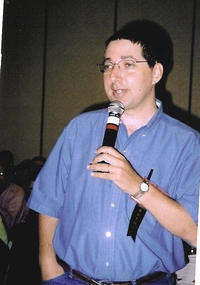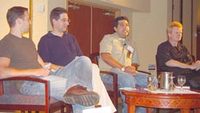As a novelist on the signing/promotion circuit, I end up going to a lot of readings, conferences and seminars…and I hear a lot of authors speak. What I’ve learned is that someone could make an awful lot of money teaching public speaking skills to authors.
It’s amazing to me that people who are so good at expressing themselves on the page can be such dull, uninspiring, and clueless public speakers, whether they are in front of five people or five hundred. They give meandering speeches while mumbling into the microphone (if they even remember to hold the microphone to their mouths), completely unaware that no one is listening to them. It seems to me like they aren’t even trying to engage or amuse their audience, to connect with them in any way. They just stand behind the podium and blunder along, reciting in mind-numbing detail the plot of their latest book, oblivious to the fact that people are jamming forks into their legs to stay awake.
So many authors look at giving a speech or being on a panel as an opportunity to sell books. It is. But people aren’t coming to hear your sales pitch or an hour-long, meticulously detailed summary of the book. They are coming to learn something about you. To get a sense of the man or woman behind the words on the page. And if what they get is a huckster aggressively trying to sell his book or, worse, someone who sucks the soul out of every single poor person in the room, then your appearance has been counter-productive. You will actually lose readers. The next time someone in that audience sees your name on a book cover, all they will remember is that boring speech that felt like a root canal without the pleasant distraction of the drill.
I’m not the world’s greatest public speaker but I can immodestly say that I don’t suck, either. While I am up there, I try to enjoy myself. I try to be energetic, to speak loudly, and to make eye contact with the people in the audience. If I can, I get out from behind the podium. I look at people’s faces and if I see I’m losing them, I change subjects, pick up the pace, or abandon my intended comments altogether and go with something else.
I like to make my audience laugh, but laughter isn’t what’s important. Your job is to be interesting and enthusiastic, to communicate your
ideas and point of view clearly and in an engaging way. You are there to entertain, educate, amuse and even provoke the audience. You aren’t there to numb them into a persistent vegatative state. Also, don’t try to be an infomercial for your book. It turns people off. They may be awake, but they hate you. They will be reflexively hitting a fast-forward button with their thumb. No one likes sitting through the commercial.
I don’t use my time at a podium or on a panel to sell my book but
to indirectly sell me, a nice, interesting and perhaps amusing guy who
has written some things you might enjoy reading or watching on television.
 You can learn to be a good, self-taught, public speaker. Many speaking engagements and conference panels are recorded. Buy the tapes. Listen to yourself. It can often be a cringe-inducing experience…but do it anyway. It’s important that you know how you sound to others. Take note of what parts of your speech, or which of your comments on a panel, worked and those that fell flat. Zero in on those places where you rambled, or blundered along aimlessly, and come up with a sharp new way of articulating the same point or answering that same question next time. And most important of all, listen to the other speakers as well. Pay attention to how they succeeded or failed…and learn from it.
You can learn to be a good, self-taught, public speaker. Many speaking engagements and conference panels are recorded. Buy the tapes. Listen to yourself. It can often be a cringe-inducing experience…but do it anyway. It’s important that you know how you sound to others. Take note of what parts of your speech, or which of your comments on a panel, worked and those that fell flat. Zero in on those places where you rambled, or blundered along aimlessly, and come up with a sharp new way of articulating the same point or answering that same question next time. And most important of all, listen to the other speakers as well. Pay attention to how they succeeded or failed…and learn from it.
I know a lot of writers are writers because they like the solitude, because they aren’t good in front of a crowd. They simply don’t like public speaking and aren’t comfortable on panels. My advice for those writers is…don’t do it. It’s better not to do the speech or be on the panel than to bore your readers.

You’re right.
More than anything, in these cases, an author has taken to writing as a medium of expression as he or she has always been so lousy socially.
Personally, I view public speaking as a creative medium. It contains all the necessary elements to qualify as one. Although it seems to me as though authors would ultimately be too conceited to take lessons. What it comes down to is an author brushing up and paying mind to his or her social skills. Storytelling was born orally; and so it’s sad to think that these folks are such buffoons when it comes to oral expression.
Who are we to criticize?—It doesn’t really matter. Feedback is A-OK and self-improvement never hurts.
“It’s amazing to me that people who are so good at expressing themselves on the page can be such dull, uninspiring, and clueless public speakers, whether they are in front of five people or five hundred.”
*Raises hand.*
Yep, that’s me. As I get closer to being published, this has grown into a concern for me. Not because I want to do readings or be on a panel, but because I want to appear intelligent when I market myself vocally. Book signings, conferences, the guy walking down the street, etc.
Maybe if more writers would actually research what comes after the book is published ahead of time that would help. At least a few of us would realize we need guidance before we get there.
I’d recommend enforced ‘audience participation’ to anyone doing a solo gig (providing you’ve got something fun for them to participate in). Do it near the start and it’ll warm them up to the idea of talking to you and asking questions. Which will make the rest of the event go a lot smoother.
Plus, if you can get them all liquored up it helps.
I’m just wrapping up a round of promotion, most of it Rotary Club talks, and I focus on treating it like a conversation with the audience. Casual, energy up, witty if possible, and I let it flow. I don’t use notes. The talks tends to be more or less the same, although after having done it 10 times or so, I feel a need to get new material. I also vary the stories and how they show up. And since part of what I talk about often is the research I do for my nonfiction materials versus the research I do for the novels, I can vary it a lot and bring up little “take home” materials and explain things a bit more, which allows me to talk about things like HALO parachute jumps, the second act of the Human Genome Project, H&K MP5s, the Diplomatic Security Service, bladder control devices, the importance of background checks for employers (these are business people, after all), the Residential Aphasia Program at U of M… you get the idea. I don’t have to lecture, but throw out little trivia that might be interesting. And I usually make a comment about, “freelance writers might not be any good at poker, but we’re killers at Trivia Pursuit.” I can’t say I get all excited prior to doing a talk, but while I’m there, I definitely try to enjoy myself, because if I don’t, they won’t. Put on your best “party” attitude, bring up the energy and try to be out-going, even if the rest of the time you’re not. Don’t be fake, but take an interest in these people whether they buy a book or not.
Best,
Mark Terry
I’ve heard that a lot of readings are taking place in bars now…
I’m a lecture agent, and we work with a lot of authors. Speaking skills aren’t just a necessity during book publicity. Public speaking can be an important source of income.
Our of our authors said to me that she was agonizing over her stage fright, and one of her friends pointed out “It’s the most profitable thing you do. You have to get over it.”
Most people aren’t good at it. But hey, most people aren’t good at driving the first time they get behind the wheel. Just like anything, public speaking skills can be improved with practice and coaching.
Larry King has some great pointers in his book HOW TO TALK TO ANYONE, ANYTIME, ANYWHERE: THE SECRETS OF GOOD COMMUNICATION. It’s worth a peek.
Bret
good points, Lee — especially the idea that the speaker should work to engage the audience in being interested in the speaker, and the interest in the speaker’s work will follow, IMO